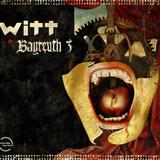For those unfamiliar with this album, well, where the hell have you been? Several of the songs from this abum have achieved such a level of fame that they have been heard by almost everyong in the Western world at some point or another, so that even if the name was completely unfamiliar if the riff were played the person would recognise it. Why is it that this album achieved such massive success? Quite simply, because it's an incredible album.
By the time of Eliminator's release, ZZ Top had been recording albums together for just over a decade, and certainly had a fairly large discography, yet it was this album that catapulted them into the massive celebrity that they have held ever since. There are several reasons behind this change, although the most obvious is that it quite simply is an extremely well done album.
Aside from that, the first major factor behind this success was the time at which Eliminator was released. MTV was still brand new and still playing music, ZZ Top had a catchy single with an interesting music video replete with old hot rods and beautiful women, and they had a unique look. As anyone familiar with ZZ Top will tell you, guitarist Billy Gibbons and bassist Dusty Hill are known for their trademark waist length beards (as an aside, during the mid '80s the Gillette razor company offered the pair a million dollars each to shave their beards off for an ad, which they refused)
The next factor has more to do with the music itself. Prior to Eliminator's release, ZZ Top had been a band that leaned far more heavily towards their blues side, and while blues was still very popular at the time in the Western market, the mass public's tastes had shifted to that of the New Wave bands and the new sounds of the musical scene of the day. With this album, however, ZZ Top made the radical decision to pair new elements of this musical scene with their classic blues rock sound. With the addition of synthesizers, heavier, more rock oriented playing, and a simpler, more driving drum beat, the band managed to encapsulate both the edgy, new sounds of the 1980s with classic blues music.
Enough of that, I'm sure most of you are thinking to yourselves by now "Get on with it and talk about the songs themselves!" Alright! I've already said that I consider this to be one of the quintessential blues rock albums (the other being 1977's compilation The Best of ZZ Top) so clearly I enjoy it. The simplest thing that I could say about this album is that there are no bad tracks. Not one. From the time that opener "Gimme All Your Lovin'" starts to the last notes of "Bad Girl" the music is excellent. This is due I think in large part to the band's history together. By this point, they had been playing music together for nearly 15 years, and they were comfortable, both which eachother and with their style. I also think that the lyrics from this album encapsulate what I love about ZZ Top perfectly, namely their humour. Nearly every track on this album has some sort of a joke in the text, excepting only the heavily blues oriented track "I Need You Tonight."
Beyond that the album is an excellent soundtrack to nearly anything. The obvious sense of fun that the band are having recording this make it an excellent background for a couple of friends hanging out, the steady rhythm make it an excellent album for long drives, for those so inclined the guitar is perfect for air-guitaring, etc, etc.
The bottom line on this album is that it is ZZ Top's masterpiece. Unfortunately, due I'm sure to Eliminator's massive success, ZZ Top have spent the past 25 years trying to record another version of it, and as such their records have not been nearly as good as they had been. But for a perfect glimpse into blues rock, ZZ Top, and the best rock of the 1980s, one need look no further than this album. Simply put, Eliminator is as close to perfect as blues rock has ever gotten.
9.5/10











